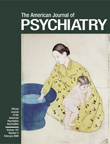Female Sexual Dysfunction Associated With Antidepressant Administration: A Randomized, Placebo-Controlled Study of Pharmacologic Intervention
Abstract
OBJECTIVE: Few controlled trials of pharmacologic intervention in women with antidepressant-associated sexual dysfunction have been reported, and there is uncertainty about the usefulness of putative treatments and the assessment methodologies. The authors evaluated the efficacy of buspirone and amantadine in the treatment of sexual dysfunction associated with fluoxetine administration. METHOD: Women who had been successfully treated with fluoxetine for at least 8 weeks and who had reported a deterioration in sexual function not present before the initiation of fluoxetine entered a 4-week assessment period. After assessment they were randomly assigned to an 8-week treatment trial with buspirone (N=19), amantadine (N=18), or placebo (N=20). Outcomes were assessed by using a patient-rated daily diary and a clinician-rated structured interview. RESULTS: While the amantadine-treated women did report significantly greater improvements in energy levels than women in the placebo group, all treatment groups experienced improvement in overall sexual function as well as in most individual measures. There were no statistically significant differences among the three groups. CONCLUSIONS: Neither buspirone nor amantadine was more effective than placebo in ameliorating antidepressant-associated sexual dysfunction. All groups experienced marked nonspecific improvement during treatment, which suggests the importance of placebo-controlled trials for this condition.



